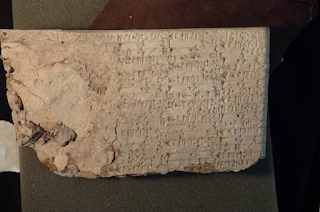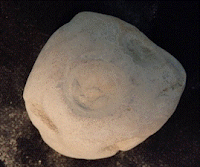Cultural Property Forfeiture: Hobby Lobby Could Pay $2000/Day if U.S. Attorney’s Agreement Violated
 |
| Cuneiform tablet subject to forfeiture. |
After a six and a half year probe by federal authority into ancient cultural property imports acquired by Hobby Lobby, the U.S. Attorney’s Office in Brooklyn yesterday filed a forfeiture complaint as part of a settlement agreement with the arts and crafts company.
The agreement, filed today in federal district court, confiscates Hobby Lobby’s antiquities purchases, compels the Oklahoma-based corporation to forfeit cash proceeds related to the unlawful imports, and mandates the company’s personnel to follow ethical collecting guidelines. Failure to comply with the settlement terms could cost Hobby Lobby $2,000 per day.
The forfeiture complaint—docketed in the Eastern District of New York as United States v. Approximately Four Hundred Fifty (450) Ancient Cuneiform Tablets and Approximately Three Thousand (3,000) Ancient Clay Bullae (17-CV-3980)—alleges that shipments of ancient Iraqi artifacts were smuggled through both the international mail facility at New York’s JFK International Airport and the FedEx facility located in Memphis, Tennessee. The items were shipped from the United Arab Emirates and Israel and misleadingly described on customs forms as “Tiles (Sample),” “hand made clay tiles (sample),” and “hand made [sic] miniature clay tiles.” The complaint goes on to say that the antiquities were significantly undervalued in order to skirt formal customs entry procedures. They also were falsely invoiced and labeled with either a false or no country of origin.
[UPDATE 7/11/17: Cultural property expert Dr. Neil Brodie breaks down the shipments in his blog post, Hobby Lobby Forfeits More Than its Reputation].
To gain title to the cultural property specified in the court complaint, which U.S. Customs and Border Protection already seized several years ago, federal prosecutors use 19 U.S.C. § 1595a(c)(1)(A). That’s the often applied federal customs law that says:
Merchandise which is introduced or attempted to be introduced into the United States contrary to law shall be treated as follows: The merchandise shall be seized and forfeited if it is stolen, smuggled, or clandestinely imported or introduced.
Prosecutors additionally cite the companion criminal statutes of 18 U.S.C. § 542 and 545 to argue that the merchandise was imported by means of false statements or other criminal means.
While government lawyers allege criminal activity, they have chosen not to pursue a criminal conviction against any wrongdoer. It should be mentioned too that federal prosecutors have deliberately singled out the shipper, not the importer, as the party who reportedly violated Title 18, arguing in their complaint that “the shipper knowingly made false declarations as to [the property’s] value, description and country of origin” and “the shipper knowingly made false declarations as to its value and description and, in failing to file formal entry declarations, omitted the required declaration as to country of origin.”
 |
| Bullae |
The forfeiture complaint, nevertheless, recites broader facts than what is captioned in the court case’s title or in the complaint’s claim for relief, describing the sale of at least 1,500 cuneiform tablets, 500 cuneiform bricks, 3,000 clay bullae, 13 extra-large cuneiform tablets and 500 stone cylinder seals. The seller pitched these artifacts as “legally acquired” by the father of an Israeli dealer during the 1960’s, according to the U.S. Attorney’s pleading.
The complaint goes on to note that in October 2010, in-house counsel at Hobby Lobby received an expert’s memorandum that explained the federal import restrictions on endangered cultural property from Iraq, the criminal penalties for their import, and an additional warning:
I would regard the acquisition of any artifact likely from Iraq … as carrying considerable risk. An estimated 200-500,000 objects have been looted from archaeological sites in Iraq since the early 1990s; particularly popular on the market and likely to have been looted are cylinder seals, cuneiform tablets . . . . Any object brought into the US and with Iraq declared as country of origin has a high chance of being detained by US Customs. If such an object has been brought into the US in the past few years and was not stopped by US Customs, then you need to examine the import documents to see if the country of origin was properly declared; an improper declaration of country of origin can also lead to seizure and forfeiture of the object.
Prosecutors explain that the purchase of the Iraqi antiquities, nevertheless, went forward in the winter of 2010. Prior to that, in July 2010, Hobby Lobby’s president and a consultant traveled to the UAE in to view many of the artifacts. The consultant thought the total collection might be appraised at $11,820,000, according to the complaint. Hobby Lobby made a deal for $1.6 million and wired payment to seven bank accounts held in the names of people other than the seller, according to the court document.
Government lawyers charge that Hobby Lobby circumvented its company protocols to obtain the objects, writing:
Commencing on or about November 9, 2010, a Hobby Lobby employee tasked with receiving and cataloguing artifacts purchased for the Collection (the “Curator”) began working with Hobby Lobby’s International Department and the Executive Assistant [to the President] to coordinate the importation of the Artifacts. The International Department advised the Curator and Executive Assistant that the Artifacts should be imported using the Customs Broker. However, after the Customs Broker reported that the Artifacts could be detained by CBP, the Curator and Executive Assistant decided to bypass the International Department and Customs Broker and have Israeli Dealers #1 and #2 handle the shipping arrangements for the Order.
Hobby Lobby began to collect cultural property around 2009. Because its arts and crafts stores do not sell ancient cuneiform tablets or bullae, the company likely imported the antiquities so that they could donate them to the company-supported museum, The Museum of the Bible. The museum incorporated as a nonprofit under Oklahoma law on September 13, 2010 and is scheduled to open its doors in Washington, DC in a few months.
To conclude its case with the U.S. Attorney’s office, Hobby Lobby agreed to terms contained in a stipulation of settlement filed with the court. The agreement’s terms do not bind The Museum of the Bible. According to the settlement, Hobby Lobby agrees to
- not challenge the government’s forfeiture action;
- assist with the delivery of the artifacts to the government;
- forfeit $3 million, which is not a fine but forfeitable proceeds under 18 U.S.C. § 981(a)(I)(C) that were generated by one or more violations of 18 U.S.C. § 542 (entry of goods by false statement), 18 U.S.C. § 545 (smuggling), or 19 U.S.C. § 1595a(c)(1)(A) (merchandise introduced into the country in violation of law)–the forfeiture complaint and settlement agreement are silent on the exact source of these proceeds;
- surrender 144 cylinder seals as forfeited assets for the same legal reasons just explained;
- not to assert any legal interest in any cultural property purchased, but not already acquired by Hobby Lobby in the $1.6 million deal, and to notify the U.S. Attorney if the company learns where the artifacts may be;
- not sell or transfer any cultural property except in accord with the Association of Art Museum Directors Guidelines on the Acquisition of Archaeological Material and Ancient Art (2013) (see criticism of the Guidelines here) or the AAMD’s Protocols for Safe Havens for Works of Cultural Significance from Countries in Crisis;
- have the personnel listed in the company’s new Antiquities Policy (unavailable in current court records) receive training within six months, and at least once a year thereafter, on customs regulations, provenance, and due diligence with regard to the purchase and import of cultural property;
- retain customs counsel to offer or supervise this training and give advice regarding modifications of the Antiquities Policy and any cultural property acquisitions;
- secure the services of a qualified customs broker; and
- provide regular and detailed reports to the U.S. Attorney over eighteen months that describe in detail the company’s cultural property imports, including the invoice price, vendor, Harmonized Tariff Schedule code, mode of transport, etc.
Failure to comply with these conditions could result in a fine costing the company $2,000 each day.
Assistant United States Attorneys Karin Orenstein and Ameet B. Kabrawala represent the government. Hobby Lobby is represented by litigator Barry Berke of the New York firm of Kramer Levin and cultural property lawyer Michael McCullough of Pearlstein, McCullough & Lederman in New York.
View a copy of the forfeiture complaint and the agreement below
Photo credit: U.S. Attorney’s Office, Eastern District of New York
Text and original photos copyrighted 2010-2017 by Cultural Heritage Lawyer, a blog commenting on matters of cultural property law, art law, cultural heritage policy, antiquities trafficking, museum risk management, and archaeology. Blog url: culturalheritagelawyer.blogspot.com. Any unauthorized reproduction or retransmission without the express written consent of CHL is strictly prohibited.

